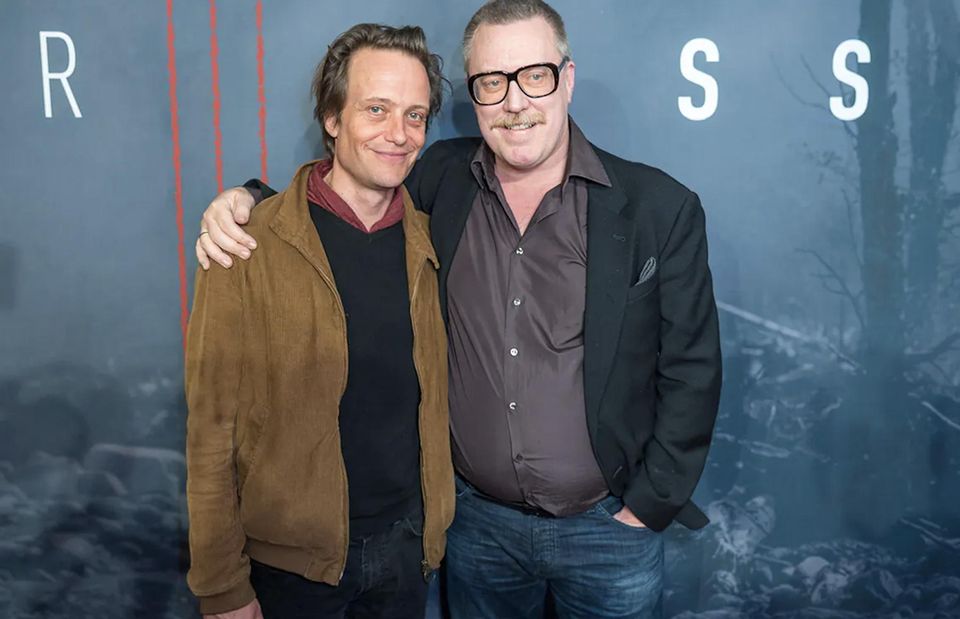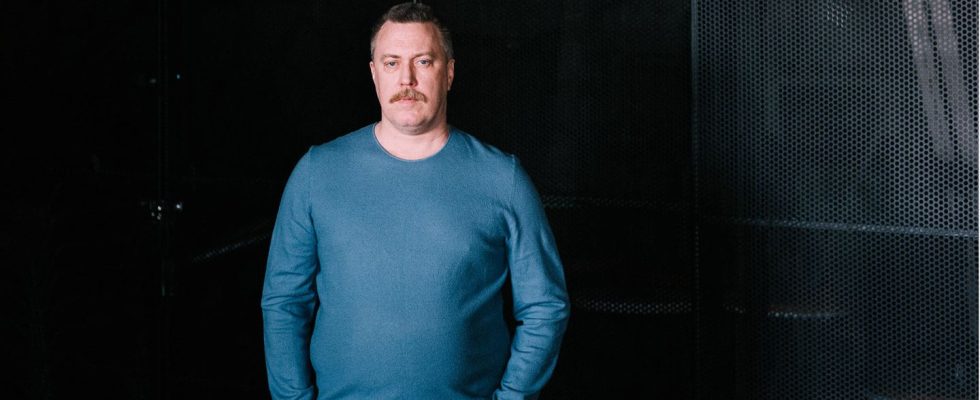In the Sky series “Der Pass III” Nicholas Ofczarek plays the craziest of all investigators for the last time. The role also made him a star in Germany. The Viennese have known him for decades as a great folk actor who is at home in all genres.
Mr. Ofczarek, are you also a nuclear power plant in your private life, as your roles would suggest?
There are worse things than getting mixed up with your roles. I’m used to it. When I was approached to play homicide detective Gedeon Winter in “The Passport” five years ago, I was surprised that the role was actually written and created for me, even though they didn’t know me personally. My wife had insisted that to come along to the very first meeting in the “Gmoakeller”, which is actually a bit unprofessional. We were both amazed at the image they had of me. I’m by no means as excessive and escalative as the directors had imagined.
It is said that they sometimes let it rip during the filming.
It’s true that I’ve gotten – well – a bit closer to that role. I smoked an awful lot, was the last one every night in the inns in the various Alpine villages where we shot, but of course I still did it professionally. What caused me more difficulties were my weight fluctuations during the months of filming. In some scenes I go into a house and come out much fatter – luckily this commissioner wears a wide coat.
They are praised for their dramatic power, although it is often the quiet and withdrawn moments where they shine as actors.
Thanks, I think so too. I’ll try to explain: If I were playing despair, then as a spectator you wouldn’t have anything to do. I play despair avoidance, I play despair suppression, because that is what desperate people really do! It should be up to the viewer what they see in my game, I don’t force any interpretation on them. He must also be a voyeur, not just a spectator.
August Diehl is a world actor, actually the greatest of my generation.”
In the last two episodes of the final season of “The Pass” there is an acting summit. You and August Diehl in a confrontation at the interrogation table. This is the highest art of the kind one very seldom sees.
August and I often meet at desks, most recently at Räuber Hotzenplotz. He’s a world actor, actually the greatest of my generation. But here, too, playing is primarily about avoidance, about taking back. And we both succeeded in that moment.
Claus Peymann, who discovered you 30 years ago and brought you to the Burgtheater, names you in a row with the greats of Austrian acting history, Hörbiger, Wessely, Meinrad, Muliar. What makes this special, is it the ability to be a major actor and popular actor at the same time?
What does all this mean – great actors, folk actors? That I can also do Wuschtel? Then yes, by me. It’s a misconception that I had a great career in mind. I didn’t care about a career, I wanted to work with good people. I succeeded.
I don’t want any inner distance to my roles”
How important is the stage presence to you, this status at the most important German speaking theater?
is that the castle The time is not there to define yourself as a great mime. The theater business is characterized by a certain contempt for actors, plays are created in dramaturges’ offices, who plays what seems to have become secondary. I don’t want any inner distance to my roles, I don’t want to speak into a microport, I want to go out. The Burgtheater is a proclamation theater, not a film set. You can’t babble on a Shakespeare on TV. But I’ve actually been lucky to always come across directors who don’t ask me for fashionable theater, such as Andrea Breth for a while and Johan Simons in recent years – by the way, a super guy, a master. I also like to take on small roles, because that’s good training for creating a cosmos in a small space – and also for humility.
That sounds like a fundamental disappointment in the theater business.
I’m not complaining, just saying I would do it differently. Unfortunately, directors no longer care about actors, no new ones are created. That’s a pity.
Can theater regain its old relevance?
Back then at Peymann’s there was an uproar, the neo-Nazis yelled from the top ranks, the country debated the plays. That’s the tradition I come from. It’s not Corona’s fault that it doesn’t exist anymore. Today one feels downright oppressed by the ideas of the dramaturge’s offices. Just because something is modern doesn’t mean it’s good. This live experience, which can be theater, would be a great opportunity. And there is definitely not enough laughter, the theater has lost laughter.
An Austrian magazine said you were going to a psychiatrist because you didn’t want to use the stage as a place for therapy. What does that mean?
That it’s nonsense, you should never misuse the stage for personal things, of course not as a place for therapy. Of course, your own conflicts, fears, despairs are something you work with and use.
Creature and subtlety: Nicholas Ofczarek, a man of many genres
Was acting a childhood dream for you?
I was a class clown, but I didn’t dream of this job. I grew up in a household where that was completely normal. What I had is some imagination. And loved to dive into this magical world of the stage.
Both parents were opera singers. How much has their world shaped you?
I knew the fascination of the stage, but also all its harshness, the vanity, desperation, intrigues, the struggle for the voice. I was allowed to experience what it means to create a magical world on stage. Both parents had to retire after their voices were sung in their mid-forties. I don’t even know if the father had a really beautiful voice, but he was ideal for the operetta, he was a good actor. His goal in life was the Volksoper in Vienna, and he achieved that. When he lost his voice, he switched to acting, although he found the profession silly. Who knows, maybe that’s why I grabbed it.
Viennese comes from within, from deep down.”
Due to the commitment of their parents, they spent their childhood in Switzerland.
We left Vienna when I was a few months old. In the meantime we lived in Graz, but then returned to Switzerland. Today the Swiss laugh at my Schwyzerdütsch. I’m supposed to speak a weird 70’s accent. I came to Vienna when I was fifteen and first had to learn my grandparents’ dialect. Viennese comes from within, from deep down, it’s not the ideal language for swearing for nothing. You have to feel it.
That’s the wondrous thing, hardly any other actor is so closely associated with the Viennese. Maybe because of this?
Perhaps? It’s not even my mother tongue, because it’s Irish. But the Ofczraeks have lived in western Vienna for generations, my grandmother was born in the monarchy, and the multi-ethnic state could still be clearly heard in her dialect. In the past, even the individual districts of the city had their own dialects. For example in Meidling, where people speak a very special L that was brought from Bohemia by the Czech brickworkers who lived there. The many open vowels in Viennese, on the other hand, come from the Hungarians. Unfortunately, my daughter hardly speaks Viennese, although she was born and grew up here.
You never left Vienna, does that have to do with moving around in your childhood?
Of course I could have left Vienna, would have had engagements in other cities, but I wanted to stay here, for my daughter, but also for myself. I wanted roots.
The name Ofczarek also suggests a Danube monarchic migration history.
When I played the robber Hotzenplotz, an association of Sudeten Germans from Munich wrote to me, who had researched my origins. So there was a certain Ofczarek in northeastern Slovakia in the 18th century that we may descend from. But the hammer was that this family Ofczarek lived only a few kilometers from the village of Osoblaha.
What’s the kicker about that?
That the German name of this place is Hotzenplotz.
So you were predestined for this role.
Nobody knew that. Personally, I wouldn’t have cast myself for the role, but it was nice to be able to play it.
Germany discovered you as an actor rather late. Actually only in 2016, when they played the “story of the evil Friederich” in the “crime scene”.
Which was really amusing because at the age of 44 I was suddenly celebrated as a new discovery by the German tabloid media. Bild reporters researched in my family environment and in my daughter’s taekwondo club whether I might also be such a berserk in my private life.

Summit meeting: August Diehl and Nicholas Ofcarek at the premiere of the third season of “Der Pass”
© Sky
And is it you?
Why is everyone trying to fathom me all the time? Why, what for?
You are an actor as an actor, people wonder what kind of person is that?
There’s this dangerous tendency in our profession to want to be a brand. I want to be the opposite, not to be classified or categorized. That’s the greatest freedom we can afford, I can’t think of any reason to give it up voluntarily. I’m a perfectionist and a mess at the same time. Of course I want to be good, but I don’t worry about how my career will go in the next few years.
You’d have to be a massive narcissist to have any charisma about yourself.”
When you look at the “passport”, do you look critically at your work, or can you dive into this plot and abstract yourself?
That wouldn’t work. I have a completely different perspective on what is seen at the end. I spend months on set, then a year goes by, it’s cut, what’s on the screen is history for me, but at the same time it has nothing to do with my experience at the time. Also, honestly, you’d have to be a massive narcissist to have any charisma about yourself.

